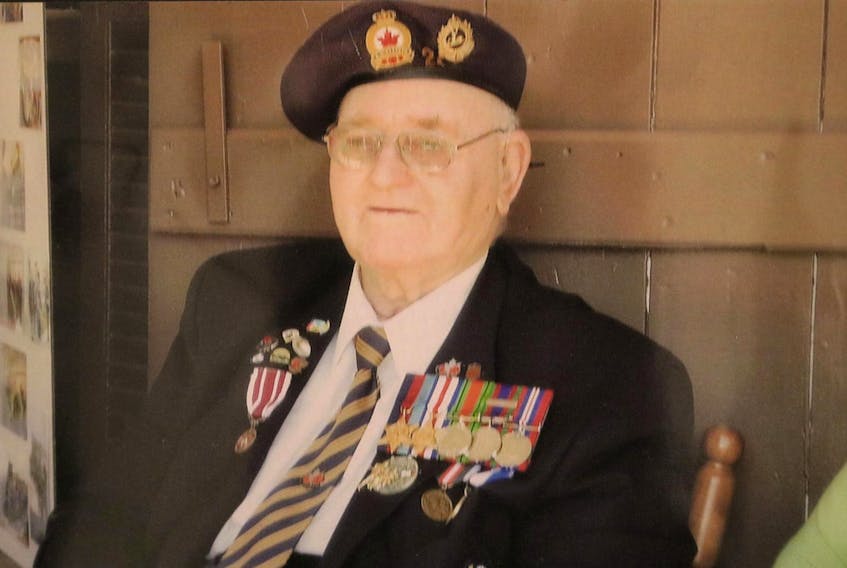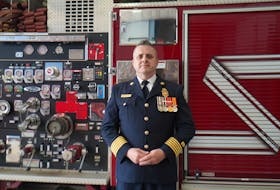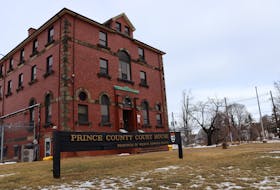Editor's note: Millicent McKay interviewed James Winn in 2014 as she prepared for a high school trip to Vimy Ridge. McKay and Winn kept in touch after the trip and maintained a friendship until his death. The pair played cribbage together and talked about the war. He died in 2015.
SUMMERSIDE, P.E.I. — James Winn was deep in thought as he sat in his rocking chair five years ago.
Looking at him, you wouldn’t be able to guess what was on his mind. That is until his eyes welled up and his breathing became shallow.
“It was a happy thing, joining the war. It gave us a job, a uniform and the idea that we were going to be somebody,” said Winn.
Winn, then 90, had become stranded in a memory.

And while his surroundings in his Summerside, P.E.I., bedroom were quiet, the sound of mortars and gunfire rang in his ears.
On June 6, 1944, the door to the landing craft opened in front of him. It was about 6 a.m. and Winn knew he had to move fast. He was one of about 14,000 Canadian troops who landed on Juno Beach in Normandy.
Slipping out of the trance of memory, Winn said, “It was every man for himself. We got into the scrap there, it weren’t very nice. But you put up with it.”
In front of him on the beach, he could see pillboxes lined up, providing cover for the enemy.
“They had to be taken out before they killed too many,” he said softly.
The paratroopers had already made their descent from the sky so Winn, and others like him, could storm the beach.
“They were a sort of distraction for the rest of us to get out of the water and onto land,” he said, only keeping eye contact for a split second, before he was taken back to France.
In the days following the D-Day landings, Winn, a member of the North Shore (New Brunswick) Regiment was reassigned from the infantry to a mortars team. But it wasn’t for long as he was left-handed and couldn’t load a mortar safely.
Soon he was reassigned to a rifle platoon and continued on with the Canadian mission into France.
“I was in the trenches, at one point,” he said.
In the hospital, back to battle
The campaign through Normandy lasted about a month before he and other troops arrived near the Carpiquet Airport. He and others were there to clean out the airport.

He said heavy fire surrounded them and at one point, he felt a sharp pang in his leg. A bullet had hit him.
“There was a lot going on,” he said.
An airburst flew above and within a moment’s notice, he was thrown backwards. The debris had torn through his (back)pack, into his back and dug into his shoulder.
Despite his injuries, he made it to an aid station.
“What are you doing? You should be up and about with your company,” said one of Winn’s superiors.
“Look at my back,” Winn replied.
“The next thing I knew, I was in a French hospital – in England. Soon they found out I couldn’t speak the language, even though I was drafted into a French regiment, so I was sent to an English hospital.”
After his back and leg wounds were treated, Winn was given seven days leave and he travelled to Scotland.
Then he was headed back to the fight.
Winn caught up with his regiment at a port in Belgium.
They marched at dark.
“There was always continuous fighting; it was the only time it was… safe, to march.”
'The war that had to be won'
During his time in battle, Winn remembered hearing about the frogmen who would search for underwater mines, the “hard water plans” the Germans had to contaminate the civilian and Allied water supplies, and the race to perfect the A-bomb.
“It made it the war that had to be won.”
Once the fighting had ended, Winn’s regiment was designated to guard 19,000 prisoners at a compound in the Netherlands.
“None of them had weapons. They had all been confiscated and were piled higher than a barn,” Winn recalled.
Winn was honorably discharged when he arrived in Halifax after the war. Two years after returning to the Island, he married his sweetheart. The couple had eight children along with several grandchildren and great-grandchildren.
Winn died on Nov. 29, 2015, at the age of 91.
D-DAY AT 75: Remembering the heroes and sacrifices of Atlantic Canada:
- VIDEO: The road to D-Day
- Why a school in France is named for a Pictou soldier
- U-boat hunter Roderick Deon returns to Juno Beach for D-Day
- Sound of gunfire rang in P.E.I. soldier’s ears
- North Nova Scotia Highlanders at the sharp end of D-Day invasion
- STORY MAP: Follow the D-Day experience of the North Nova Scotia Highlanders
- 12 North Nova Scotia Highlanders murdered at Abbaye d’Ardenne
- ‘It was noisy as the devil,’ says St. John’s torpedo man
- 59th Newfoundland Heavy Regiment was eager to do its part
- A P.E.I. dispatcher’s long, uncertain journey to Normandy
- LAURENT LE PIERRÈS: D-Day invasion was best birthday present for my Dad
- ‘Sight of our boys being blown up ... wouldn’t leave my mind:’ Bedford veteran, author
- Dartmouth veteran's first combat mission was D-Day invasion
- Halifax air gunner had bird’s-eye view of D-Day
- ‘We had everything fired at us but the galley sink’: Yarmouth County veterans share war and D-Day memories
- New Waterford veteran has lived good life after surviving D-Day invasion
- JOHN DeMONT: An old film clip of D-Day shows the nature of courage
- D-Day landing map’s origins a mystery to army museum historians









